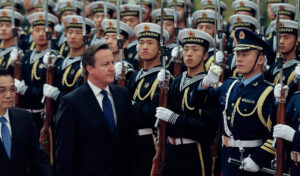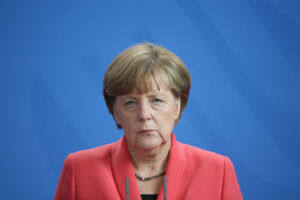“Today’s Germany is the best Germany the world has seen.” So effused the Washington Post columnist George F. Will five long years ago. It’s hard to imagine anyone — even a German — writing those words today. The country is in crisis. On Monday, Chancellor Olaf Scholz lost a humiliating no-confidence vote, and now Germany is hurtling towards a divisive snap election in February. The nation’s economy has barely grown since 2018, and it is de-industrialising at an alarming rate. The unfolding calamity represents a strategic opening for China and Russia which the West cannot afford to ignore.
At the root of Germany’s industrial woes is electricity, which is now nearly twice as expensive as it is for their American counterparts, and three times more expensive than in China. Prices have been rising since the early 2000s, but a policy embraced by the German government in 2011, following the nuclear meltdown at Fukushima, sealed the nation’s fate. The proponents of the Energiewende (“energy revolution”) policy made the astonishing argument that Germany could rapidly abandon both fossil fuels and nuclear energy without losing its industrial edge. This was, as one Oxford study put it, a “gamble”. Or a game of Russian roulette, a cynic might have added.
The gamble hasn’t paid off. Even Germany’s gas-related dealings with Russia — a source of Russo-American tension since the Sixties — couldn’t stop prices rising throughout the 2010s. They were significant enough, however, to make the shock of Russia’s invasion of Ukraine in 2022 nearly lethal for German industry. Today, electricity prices are at their highest since 2000, with total production hitting its lowest point since then.
This makes it incredibly tough for Germany to compete with China. Not only does Russian gas continue to flow to China in ever greater quantities, but the Chinese are also receiving sanctioned Iranian oil; installing more than 90% of the world’s new coal power capacity; putting the finishing touches on a hydroelectric infrastructure that already generates more power than Japan; and building ever more nuclear power plants. All this has ensured a fundamental manufacturing advantage over Germany.
But there’s more to the tale of German decline than cheap electricity. The past two decades have also witnessed an industrial revolution of sorts: at the turn of the millennium, China churned out cheap junk and not much else. Now, though, it is shaping up to be a formidable and sophisticated rival.
The car industry is a prime example. Today, Chinese electric vehicles are among the best and cheapest in the world, posing a menace to domestic production in Germany and the rest of Europe. But this was not always the case. As one post on r/CarTalkUK, a Reddit group with half-a-million users, puts it: “I remember only a few years ago when Top Gear went to China and showed us all those horrific knock-off death trap shit-boxes that looked like mutilated Minis… now those things are seemingly a thing of the past.” The EU is well aware of this development, having just slapped tariffs on Chinese cars that would make Trump blush. And it’s not just cars — China dominates many key markets, including drones, shipbuilding, solar panels, and wind turbine components to name just a few, and is making strides in other areas too.
Consider its acceleration. The nation started out by hawking junk, leveraging cheap labour to build up healthy export surpluses. This provided Chinese companies with the cash to invest in moving up the supply chain and, critically, to go shopping abroad. In 2004 and 2005, Chinese state-owned enterprises bought up F Zimmerman and Kelch, two of the world’s leading machine tool companies whose highly specialised equipment is vital for thousands of manufacturing processes. Of course, buying companies doesn’t necessarily hand its new owners the keys to the kingdom: transferring high-end R&D and manufacturing processes to China and training up loyal Chinese engineers and scientists who won’t emigrate can still be scuppered by export control laws, union action, political intervention and so on. But it’s a pretty useful strategy that sooner or later creates opportunities.
Another tool at China’s disposal has been the joint venture system, whereby German manufacturers who wish to set up shop in China are expected to share their critical knowledge and technology with their Chinese competitors. This kind of pact may seem utterly Faustian, but dozens upon dozens of high-profile companies have signed up. This includes Volkswagen, which now finds itself shutting down its German factories for the first time in history, in the face of ever more daunting competition from Chinese rivals.
China’s twin strategies — joint ventures and purchases — were both turbocharged by the financial crisis. And still Germany did nothing. A series of new laws that might have enabled better government screening and intervention were passed in 2013, but not used for years.
By 2016, the threat could no longer be ignored. That year, Chinese interests took control of a hugely important German company, the robotics giant KUKA. Their products are used in a whole range of industries: from carmakers and battery manufacturers to medical device companies and aerospace companies such as Airbus. Along with another big deal that year, the purchase of the plastics processing machine company KraussMaffei, the alarm was sounded.
Yet Germany kept on hitting snooze. It wasn’t until 2018 that the government first cited security concerns to block a major takeover, this time of the metal forming specialist Leifeld Metal Spinning. The same year, then economic minister Peter Altmaier proposed a special government fund to buy German firms facing a foreign takeover. The idea came to nothing.
Slowly, however, the Germans have been wising up to the competition. A series of legislative changes have updated the 2013 foreign takeover screening tools, enabling more intervention in recent years. There have been around a dozen or so measures taken against acquisitions every year since 2019, with hundreds more scrutinised but left to proceed.
Arguably, this is all too little, too late. Thanks to decades of investment in tech acquisition through takeovers, industrial espionage and joint ventures, as well as complementary investments in human capital, China now has its own high-tech innovation ecosystem. The days of Chinese copying are not over per se, it’s just that copying is now accompanied by homegrown invention.
Last year, China accounted for more than half of the world’s industrial robot installations and surpassed Germany and Japan in industrial robot density, a key measure of automation. This will potentially enable China to avoid old trade-offs associated with the transition from low- to high-end industry. In a contrast with the historical experience of some developed nations, China may not need to offshore low-end industry to wherever labour is cheaper, instead leaning on automation and cheap energy to keep supply chains national — a strategic boon in an era of growing tensions.
The US cottoned on to China’s industrial coup in 2016 and began responding. Donald Trump’s China policy, his “trade war”, was adopted and further developed by Joe Biden after 2020. The focus on technology, industry and China is now a central pillar of US foreign policy, and historians will surely view 2016 as a historical turning point in China-US relations.
By contrast, it has taken the EU eight years of damage to start a serious conversation about China — despite being a prime victim of high-tech industrialisation. And it only began in September, when former Italian prime minister Mario Draghi published a report on European competitiveness for the European Commission. This has since been promoted by the President of the European Commission Ursula von der Leyen in the context of the escalating dispute about European protectionism against Chinese electric vehicles.
And still it seems that the EU’s response to China’s innovation boom will once again be late and ineffective. One only needs to look at the battery sector to see why. In an attempt to turn the tables, the EU has hinted that it will block Chinese companies from accessing its electric battery grants when investing in Europe: unless they hand over their superior battery technology. This is the very same trick that China played on Europe for years, but the EU’s hand is undermined by the weakness of European battery initiatives. Just last month, “Europe’s Tesla”, the “battery champion” Northvolt, declared bankruptcy.
Add to this EU infighting. The troublemaker in chief is Viktor Orbán’s Hungary, which argues against an “economic cold war” with China, having received nearly half of all Chinese investment into Europe in 2023, including funding for a major automotive plant that is now subject to retaliatory probes from the EU Commission. Germany must balance its own interests with those of an increasingly fragmented trading bloc.
With German industry collapsing, nationalism is on the rise once again. Since July 2023, the anti-EU, anti-immigration AfD has consistently been rated the second most popular party in national polls. And in June’s European Parliament elections, the AfD came second, winning most support in the old East. In September, it won a plurality in the eastern state of Thuringia, but has yet to form a governing coalition.
The region is also home to another radical political force: Sahra Wagenknecht, whose nascent Left-wing populist party is named after her. A half-Iranian former Stalinist and self-described “Left conservative”, Wagenknecht has attempted to unite anti-immigration, anti-Nato and pro-Russian politics, arguing that “Nato must be dissolved and replaced by a collective security system including Russia”.
Both Wagenknecht and the AfD have been investigated by the Federal Office for the Protection of the Constitution (BfV) — Germany’s equivalent to MI5. In particular, the BfV has embroiled itself in legal disputes with the AfD, which it has successfully argued in court should be subject to surveillance on the basis it is a suspected anti-constitutional organisation. This is due to its supposed anti-Muslim, anti-refugee and anti-democratic rhetoric. The AfD has also endured espionage investigations involving Russian and Chinese financial and personnel infiltration.
For such a popular party to be treated as if it is a terrorist organisation raises questions about the strength of Germany’s post-Cold War regime. Does it risk shedding legitimacy by stigmatising widely held concerns? Or can it accommodate and temper the emerging political forces that have been nurtured by years of mass immigration and are now best set to capitalise on looming de-industrialisation? There is already evidence that voters in Western industrial areas may be the vanguard of possible AfD gains outside the old East — AfD politicians continually attack Net Zero, responding to fears about industrial jobs. Then there’s Wagenknecht, who warned ominously in 2022 that Germany risks experiencing “incredible deindustrialisation” without major reform. Her solution is peace with Russia and renewed gas imports. This autumn’s state elections in Thuringia, Brandenburg and Saxony suggest these messages are hitting home.
Despite the swell of popular discontent, there is little sign that Germany’s February election will change enough to reverse the energy crisis. At this rate, Germany’s industrial woes are set to continue, multiplying opportunities for China to steal a lead in key areas. Meanwhile, Russia will dangle the promise of unlimited gas before the eyes of the growing AfD and Wagenknecht movements. These insurgents may yet experience breakthroughs outside of the former Soviet East, prompting a constitutional crisis at worst, or otherwise forcing the established parties into major policy adjustments. Already, Scholz has announced unilateral steps effectively to suspend Schengen, Europe’s free movement system, after coming under pressure over immigration.
This is without doubt the most severe crisis Germany has faced since its rebirth 34 years ago, when the former president Richard von Weizsäcker promised that the fledgling republic would “serve peace in the world in a united Europe”. How, though, can Germany do so when both peace and a united Europe have proven so elusive? Uncomfortable as it is to admit it, history is far from over for Germany. The nation may yet decide that it is better simply to serve itself.
Disclaimer
Some of the posts we share are controversial and we do not necessarily agree with them in the whole extend. Sometimes we agree with the content or part of it but we do not agree with the narration or language. Nevertheless we find them somehow interesting, valuable and/or informative or we share them, because we strongly believe in freedom of speech, free press and journalism. We strongly encourage you to have a critical approach to all the content, do your own research and analysis to build your own opinion.
We would be glad to have your feedback.
Source: UnHerd Read the original article here: https://unherd.com/





